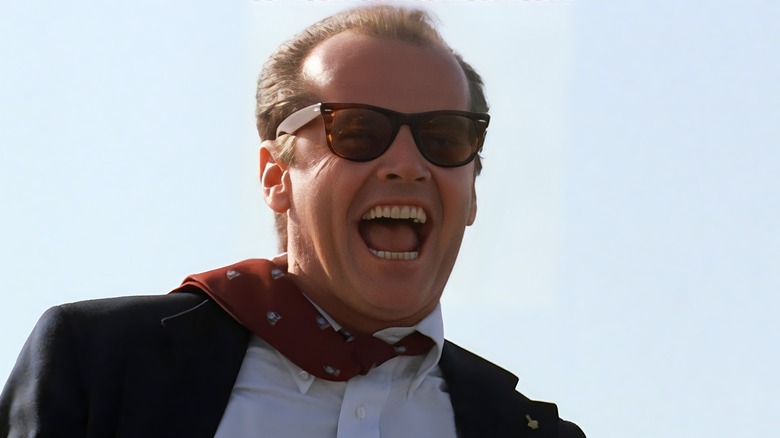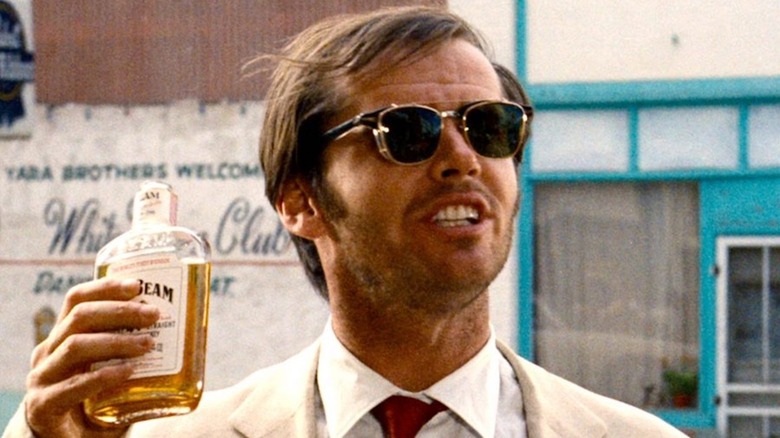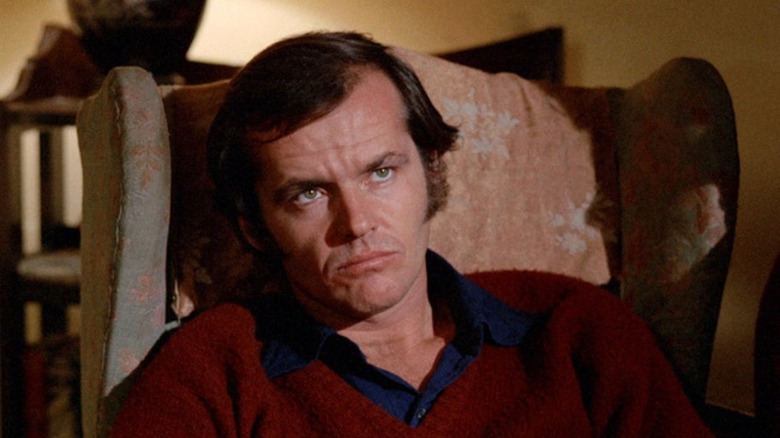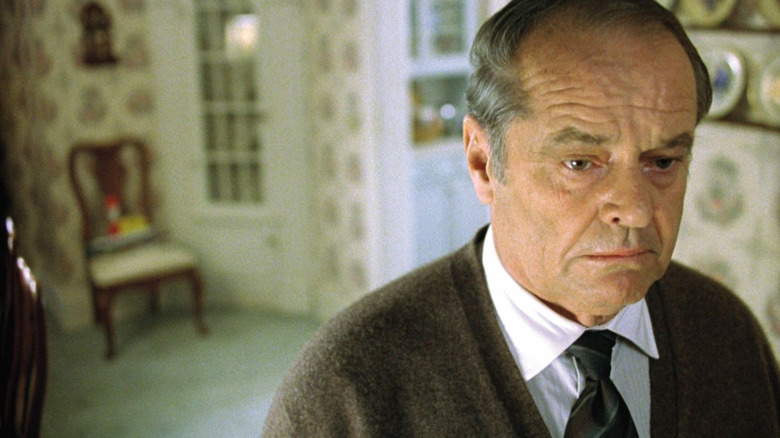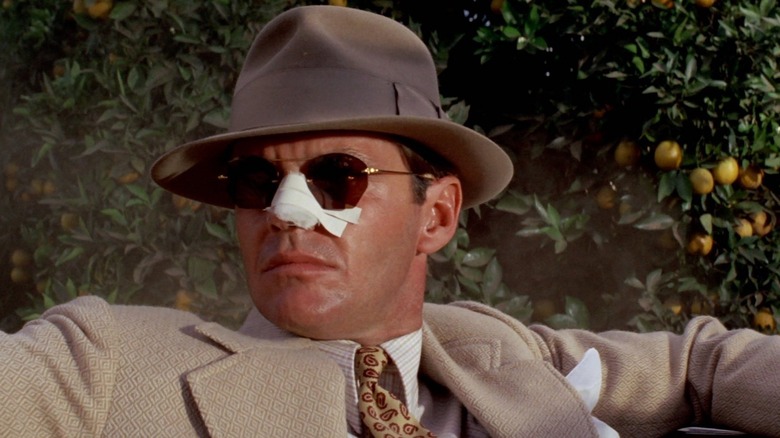Jack Nicholson Is The Best Actor Ever
On April 28, 2023, the sports and entertainment worlds lit up with joy at the sight of Jack Nicholson taking his courtside seat at Crypto.com Arena for the Los Angeles Lakers' semifinals-clinching game against the Memphis Grizzlies. This was the 86-year-old star's first appearance at a game since the home opener of the 2021-22 season, and it dispelled rumors of ill-health that had flitted about due to his absence from the public eye.
Ever since his career took off in the late 1960s, Nicholson exemplified Hollywood stardom. He played the celebrity game with devilish glee, donning his Ray-Ban sunglasses and strutting down red carpets to the delight of shutterbugs and fans. He was a near-constant presence at the Academy Awards, where he typically sat in the front row because, well, he's Jack. And no Lakers home game felt official without him sitting just to the right of the visiting team's bench with his filmmaker/record-producer buddy Lou Adler.
Why do we love Jack so much? Because he loves being Jack. Normally, we use a person's last name when we write about them, but the whole world has a first-name familiarity with Jack. He's always possessed an air of insouciance. Nothing seems to bother him. He's played losers and monsters, and he's always the most electric performer on screen, but when he steps out, we get maximum Jack. Tom Cruise is probably the next most adept at cashing in on his high-wattage charm, but you can see the effort. Jack just shows up and grins, and that's more than enough.
The casualness of his off-screen existence allows him to surprise us time and again when he makes a movie — which, sadly, he hasn't done since 2010. Cinema hasn't been the same without him.
The breakout
Jack Nicholson was born to 17-year-old June Frances Nicholson on April 22, 1937. He was raised by his grandparents, and had no idea his "sister" June was his mother until Time magazine researchers revealed the truth of his parentage to him in 1974, which was, ironically, the same year he starred in "Chinatown." He shook the revelation off, saying he was "pretty well psychologically formed" by that point in his life.
An inveterate troublemaker in high school, Nicholson discovered a love for acting and made his big-screen debut as the star of Roger Corman's "The Cry Baby Killer." This was the beginning of a creative alliance for which Nicholson is touchingly grateful (as evidenced by his emotional comments in Alex Stapleton's 2011 documentary "Corman's World"); his portrayal of the masochistic dental patient Wilbur Force in Corman's "Little Shop of Horrors" is an uproarious preview of the madness to come.
After hooking up with the filmmaking duo of Bob Rafelson and Bert Schneider (yes, Nicholson has a "written by" credit on The Monkees' brilliantly surreal flop, "Head"), he replaced the ornery Rip Torn as alcoholic lawyer George Hanson in Dennis Hopper's New Hollywood thunderbolt, "Easy Rider." Nicholson is a tic-heavy hoot, and gained cinematic immortality via his "Nick, nick, nick ... Indians" reaction to bolting down a swig of Jim Beam (a quintessentially bizarre Jack moment that would kill a movie if attempted by anyone else). He only gets 17 minutes of screen time, but he infuses the film with a jagged exuberance right as it's starting to sag.
Nicholson's performance was vivid enough to earn him an Academy Award nomination for Best Supporting Actor. With Hollywood undergoing a rebellious reinvention, he was poised to be the era's ideal leading man.
The career part I
Jack Nicholson's artistic ambitions reached beyond acting. He wanted to write and direct, and he did so with middling success. His 1971 filmmaking debut, "Drive, He Said," is a daringly undisciplined must-see. It's incredibly well-acted, and crackles with the convention-flouting brashness of the era. It's an unsettling film — Nicholson has a storm brewing inside, but he can't quite wrangle it as a director.
This fury is concisely conveyed when he steps in front of the camera. As piano-playing prodigy Bobby Eroica Dupea in Rafelson's "Five Easy Pieces," Nicholson unleashes a torrent of masculine insecurity. Dupea is a drunken failure, a man coping with the unrealized promise of his youth. He drinks and screws with reckless abandon, but he must eventually reckon with the fact that he is an aimless mediocrity. Nicholson is almost too charismatic for this part (the famous diner scene plays a tad false), but by the dour conclusion we have a decent measure of Dupea's agony, and we ache with him.
Everyone wanted Nicholson at this point, and those who got him generally wrung the best out of the actor. He's an incandescent prick in Mike Nichols' "Carnal Knowledge," and a surly delight in Hal Ashby's "The Last Detail." Nicholson won his first Best Actor Oscar for his live-wire portrayal of Randle McMurphy in Miloš Forman's "One Flew Over the Cuckoo's Nest," which prompted him to take a series of risks that didn't pay off.
The career part II
Jack Nicholson closed out the 1970s with three of his most confounding performances in "The Missouri Breaks" (opposite Marlon Brando), "The Last Tycoon," and "Goin' South" (which he also directed, albeit with less elan than he brought to "Drive, He Said"). He bounced all the way back as deranged author Jack Torrance in Stanley Kubrick's "The Shining," but this role is also the codification of Jack. It's a great film, and Nicholson delves into the psychosis of a blocked-up author, but he's grandstanding much of the time.
This is the Jack of "The Witches of Eastwick," "Batman," "A Few Good Men," "Wolf," "Mars Attacks!" and "The Departed," but no one's ever coasted more gracefully. If you were looking for a bankable star to play the devil, the Joker, or the President of the United States, your list began and ended with Jack Nicholson, and he delivered with interest. You couldn't wait to get a load of his next splashy performance (and he made the studios pay handsomely for our pleasure).
This is where some actors check out and cash paychecks (see Robert De Niro in the 2000s), but Nicholson remained engaged. He's splendid as Eugene O'Neill in "Reds," and turns "Terms of Endearment" aglow as fun-loving astronaut Garrett Breedlove. He smolders with his real-life paramour Angelica Huston in "Prizzi's Honor," and is a proper philandering cad opposite Meryl Streep in "Heartburn." Nicholson's performance as a beatdown retiree in "About Schmidt" earned him raves and an Academy Award nomination, but he was far more impressive as a driven detective in "The Pledge."
If Nicholson's turn as a prison-bound executive in James L. Brooks' underrated "How Do You Know" is his valedictory, it's a fine one. But to understand the essence of Jack, only one movie will do.
The defining performance
Like all iconic hard-boiled private detectives, Jake Gittes doesn't care. Outwardly. The protagonist of "Chinatown" is hired to investigate an alleged infidelity being committed by Hollis Mulray, the chief engineer of Los Angeles' water and power company, but when the case cracks open a lead on civic corruption, his curiosity gets the better of him. Jake follows the breadcrumbs, and gets one of his nostrils slashed by a mob enforcer for being too nosy. He keeps digging, however, because that's what men with Gittes' investigative prowess and stained conscience do.
Gittes is a smart man. He's capable. But he can be seduced, and soon finds himself in the bed of Evelyn Mulwray (Faye Dunaway). This is all classic film noir business, but what Jake doesn't know is that Evelyn is concealing the darkest of secrets tangentially related to his case. Her father, Noah Cross (John Huston), is conspiring to incorporate the Northwest Valley into the municipality of Los Angeles, but the businessman's original, despicable sin is siring a daughter by his daughter. Katherine Mulwray is Evelyn's sister and her daughter. And we need Cross to pay the ultimate price for his wickedness.
Jack Nicholson imbues Gittes with his trademark nonchalance, but the depth of Cross' wrongdoing penetrates his world-weary façade. Jake is one of those men who ventures down these mean streets bereft of stain and fear. We often see Nicholson as a libertine, in movies and real life, but here he is a man of honor. Gittes quit the LAPD because he failed to measure up to his morals. He could not abide by his chosen profession under the department's aegis.
The works of Dashiell Hammett and Raymond Chandler have an episodic tidiness that allows their heroes to move to the next case with a modicum of grief. Nicholson's Gittes, however, is destroyed by Evelyn's death, and he carries this desolation into "The Two Jakes" (a teetering-on-greatness sequel directed by Nicholson). Jack can't smirk his way out of this tragedy — what you do on this planet matters. We love Jack, but only because he broke open his soul and showed us that even the most flippant of men will eventually meet with misery.
